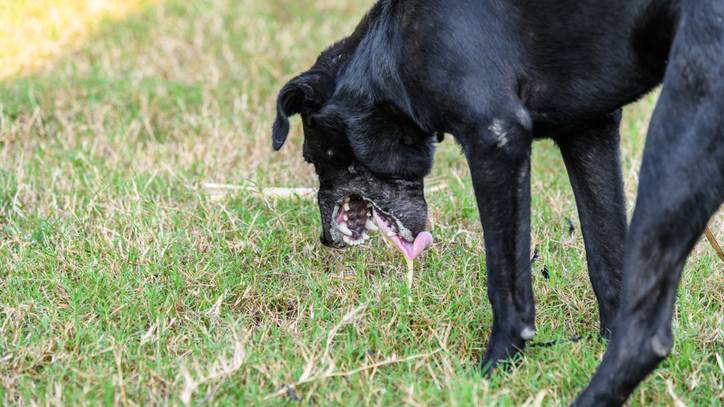Upset stomach in dogs: Symptoms, causes, and treatments
Upset stomach in dogs is common, so we asked vet Dr. Jo Woodnutt for some tips on how to treat it

One of the most common conditions vets see in practice is an upset stomach in dogs. After all, many things can cause an upset stomach, from a dietary change to a virus, to ill-advised scavenging.
An upset stomach in dogs can vary in severity – sometimes it’s a mild, 24-hour problem that rights itself, but at other times dogs can become really sick and need hospitalization. We’ll go through some of the common causes of dog upset stomachs and what to do about them.
What are the symptoms of an upset stomach in dogs?
Dogs with an upset stomach are usually vomiting, but they can also have many other symptoms. Diarrhea in dogs is also common and will often go hand-in-hand with an upset stomach. Other signs that suggest your dog has an upset stomach include:
- Borborygmi (gut making gurgling sounds)
- Adopting the ‘prayer position’ with elbows and chest on the floor and bum in the air
- Looking at stomach
- Flatulence
- Unsettled, aloof, or clingy behaviour
- Asking to go out more than usual
- Going off their food or reduced appetite
- Change in thirst
Your dog doesn’t have to have all of these signs of an upset stomach, many dogs will be vomiting but still have a normal appetite, toilet, and behavior.
What causes upset stomach in dogs?
There can be many causes of an upset stomach in dogs. They can broadly be split into dietary causes, diseases, and behavioral causes. The most common causes of an upset stomach in dogs include:
1. Garbage gut
Probably the most common cause of an upset stomach, ‘garbage gut’ (properly known as ‘dietary indiscretion’) is well known to most Labrador owners!
This vomiting comes after raiding a dustbin, sneaking some rotten sandwich remains on a walk, scarfing some deer poop, or generally eating things that aren’t good for them. Unless they’ve eaten something particularly moldy or toxic, this type of upset stomach usually passes of its own accord after a day or two.
2. Dietary change or unsuitable diet
A sudden dietary change can cause an upset stomach, especially if a dog is particularly sensitive. This is why vets always recommend changing foods gradually, to give a dog time to adjust.
Again, this type of vomiting in dogs is generally self-limiting and will resolve on its own after a couple of days. An unsuitable diet can also cause an upset stomach if it’s inappropriate or incomplete. For example, raw food is more likely to be contaminated with food-borne bacteria and this can be a cause of upset stomach in dogs.
3. Foreign body
A foreign object in the intestines is a common cause of vomiting. This can be extremely serious and even fatal if left untreated, so if you suspect your dog has eaten something indigestible, you should call your vet for advice immediately. Common foreign bodies include parts of toys, string, bones, corn-on-the-cob, and stones.
4. Pancreatitis
Pancreatitis is a painful inflammation of the pancreas that is relatively common in dogs. It may be set off by a fatty diet, but some dogs also have chronic pancreas problems. It causes vomiting and abdominal pain and often requires hospitalization for pain relief and fluid support whilst an animal regains their appetite.
5. Irritable Bowel Disease (IBD)
Whilst the most common symptom of IBD in dogs is diarrhea, some dogs will also have an upset stomach. These dogs will be sensitive to dietary change but will often have waxing-waning symptoms with no identifiable cause. IBD can be difficult to diagnose but your vet will be able to help.
6. Hormonal diseases
Many of the hormonal diseases, such as diabetes or Addison’s, can cause an upset stomach in dogs. These generally affect dogs reaching middle age but shouldn’t be ruled out in a dog with ongoing waxing-waning symptoms of an upset stomach.
7. Parvovirus
Although relatively uncommon thanks to the number of vaccinated dogs, we still see parvovirus regularly enough for it to feature on this list. Generally, it affects unvaccinated dogs, especially puppies. There is no cure and many dogs will be too severely affected to survive.
8. Seasonal Canine Illness
This rare illness appears to be on the increase, so it’s worth mentioning here. Seasonal Canine Illness (SCI) causes an upset stomach and lethargy within 72 hours of being in a woodland area. Although there is currently no cure, dogs that receive prompt treatment, often including hospitalization, will usually recover.
9. Kidney or liver disease
Kidney disease and liver disease often cause vomiting and many of the symptoms of an upset stomach. Most dogs with these conditions will be older, but kidney and liver disease can affect dogs of any age. Unvaccinated dogs may also catch leptospirosis, which causes these organs to fail.

How to care for a dog with an upset stomach
If your dog develops an upset stomach, the first thing to do is to make sure they have plenty of water available. You should monitor them for other symptoms, especially lethargy, and call your vet if you spot anything that seems concerning. If your dog seems bright and alert, is under six years old, and their vomiting has been going on for 24 hours or less, you can usually continue to monitor them at home.
When it comes to feeding a dog with an upset stomach, there are two schools of thought. Some vets advise to withhold food for 12-24 hours, then feed them a bland diet, usually chicken and rice. However, chicken and rice is not a complete diet – it is missing vital nutrients and might slow your dog’s recovery.
And a further dietary change on top of a stomach upset might not be a good idea. Even whether to withhold food is a hot topic of debate amongst vets but science is starting to suggest that feeding helps to heal the gut and stomach. My advice is generally to feed them either their usual food or prescription food for upset stomachs, little and often until they recover.
What to give a dog for upset stomach
It’s generally best not to give your dog anything for their upset stomach. Most mild causes will pass of their own accord within a day or two. However, if your dog is prone to an upset stomach, perhaps due to a condition (or an over-appreciation for the contents of the dustbin!) you may want to keep some probiotics on hand to help their gut recover.
Dogs with an upset stomach caused by IBD or other similar conditions may benefit from a special diet designed to be gentle on the stomach.
Can you give a dog Pepto Bismol?
It’s not a good idea to give your dog human medication unless specifically advised by a vet. Whilst it might seem like a cheap and easy option to give your dog Pepto Bismol, it might make things a lot worse if your dog has certain medical conditions or is on other medicines. In addition, an overdose of Pepto Bismol can be life-threatening.
Lastly, although Pepto Bismol might help some causes of vomiting, it won’t help others – and delaying a veterinary opinion whilst you wait to see whether it works can cause serious problems.
When should I worry about my dog’s upset stomach?
Some causes of an upset stomach in dogs are mild and self-limiting – in other words, they will go away on their own and not cause any lasting damage. On the other hand, some causes are serious, and can even be fatal.
Signs that an upset stomach is more serious include lethargy, being unable to keep water down, or if it continues for more than 24 hours. However, I always tell people to trust their gut instinct when it comes to your dog – if you’re worried, it’s always better to get them checked out.
PetsRadar Newsletter
Get the best advice, tips and top tech for your beloved Pets
After graduating as a vet from the University of Nottingham, Dr Joanna Woodnutt went on to practice companion animal medicine in the Midlands. Since then, she has also written for countless online and print publications and is a regular contributor for Edition Dog Magazine.

